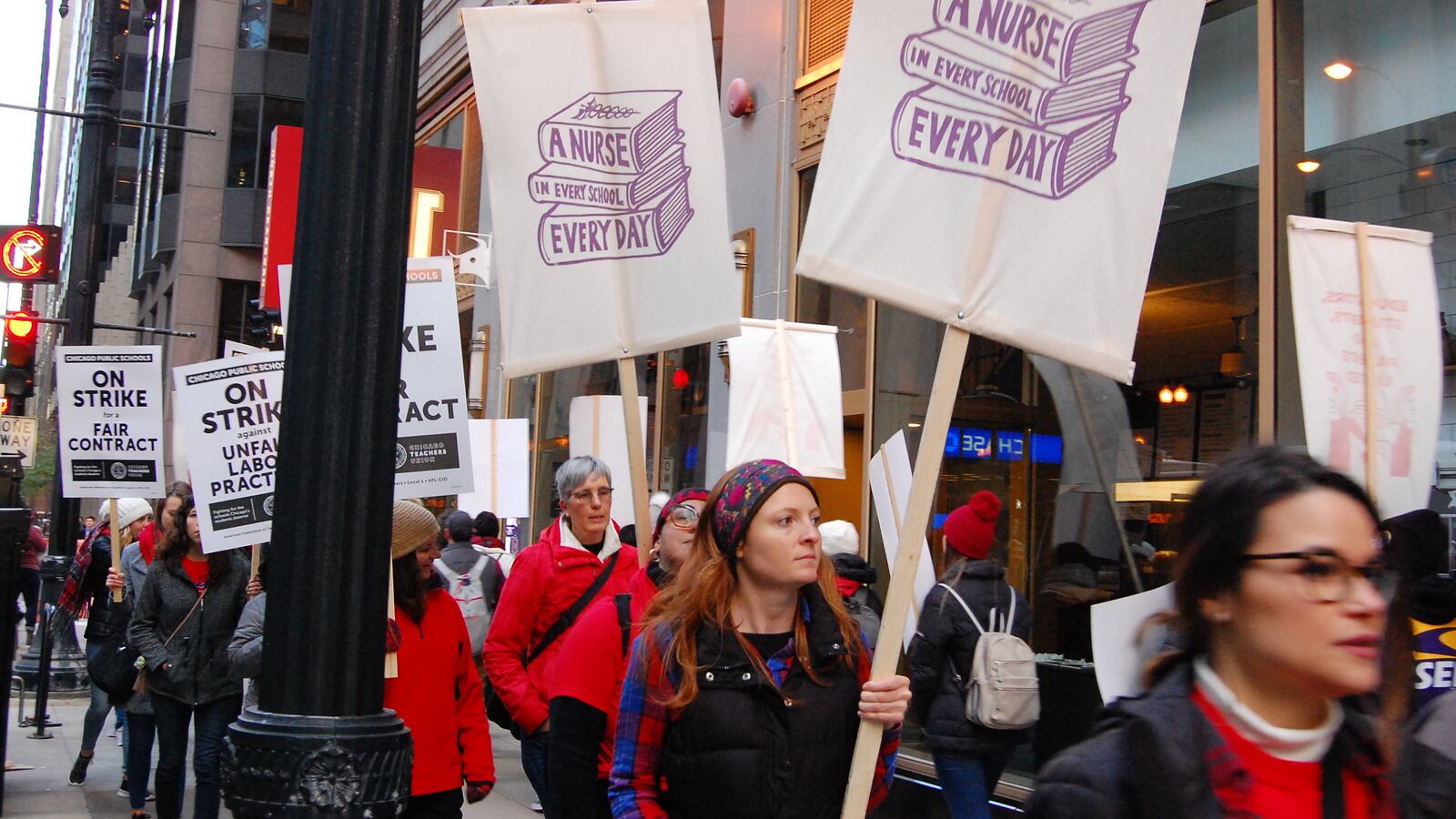
My son is a 12th-grader with special needs in Chicago. When he started kindergarten, I was told by the school that they would not be able to give him his medication every day as they only had a nurse once a week. This was anti-seizure medication. It was not optional. The school’s solution was that his father or I should come to the school every day to give it to him. I was shocked. It seemed incomprehensible that the third-largest school district in the United States did not have a full-time nurse in every school.
Twelve years later nothing has changed. My son is now in a specialty high school where all the students have disabilities, so they do have a full-time nurse. But others are not as lucky. At a school on the South Side, where a friend teaches, the secretary has to give diabetic students insulin shots because they only have a nurse one day a week.
This is why I support the Chicago teachers’ strike. The union is demanding fully staffed schools, enforceable caps on class sizes, social justice for students and their families, and better pay and benefits. Fully staffed schools mean professionals like nurses, counselors, social workers, case managers and librarians in every school. Yet there are only 300 nurses to cover more than 500 Chicago public schools.
The city also needs more social workers and librarians. National standards call for one social worker for every 250 students, one for every 50 in high-trauma areas. Yet, in violence-plagued Chicago that ratio is 1:730, according to the city. Meanwhile, many schools go without libraries or librarians — my son’s school has neither. I assume that’s because Chicago Public Schools thinks that a 17-year-old who reads at a third-grade level doesn’t need a library. But students in high-poverty schools and those with special needs are the very children who so desperately need a library with a knowledgeable librarian.
The Chicago Teachers Union is also fighting for enforceable class size limits. By Chicago’s high and unenforceable standards, a union analysis found nearly 25 percent of classes are overcrowded. I’ve met parents and teachers from schools where the elementary classes are over 40 children. How can anyone teach or learn in a class of 45 kindergarteners? When my son was in first grade, the school was overcrowded so they decided to convert the Resource Room into a regular classroom. As a result, students with disabilities like my son had to do their lessons in the supply closet.
Yet, these conditions are not uniform across Chicago. Students with disabilities, like students from poor, minority and immigrant families, have borne the brunt of Chicago Public Schools’ austerity policies. Schools in more affluent areas have been able to pass around the hat when public funds dry up. My son went to middle school in the affluent Lakeview neighborhood on Chicago’s North Side. When the school board cut positions, the school simply asked parents to chip in. The suggested minimum donation was $1,000 per family. How can schools with struggling populations keep up?
This strike is difficult for all parents, but it is especially difficult for parents of students with special needs. My son, like most children with special needs, thrives on routine and certainty. The disruption to his schooling and the uncertainty about when school will resume has been hard for him to process, and he is not getting the speech or occupational therapy that he normally receives. And it’s been difficult for the parents of special needs children, too. We cannot send our kids to a school or program where there is no one who understands their unique needs.
Despite these difficulties, I support this strike. Chicago Public Schools has been operating on an unfair austerity budget for too many years. There is finally more money in the system, thanks to a new state funding formula. We have a new mayor who supported many of the union’s proposals when she was running for election. I am very disappointed that she has been unwilling to put these into writing and give our teachers the fair contract that they and our students deserve. So until then, my son and I will be supporting his teachers and joining them on the picket line.
Catherine Henchek is the mother of a high school student with disabilities and a member of Parents 4 Teachers. She lives in the Portage Park neighborhood of Chicago.
About our First Person series:
First Person is where Chalkbeat features personal essays by educators, students, parents, and others trying to improve public education. Read our submission guidelines here.

